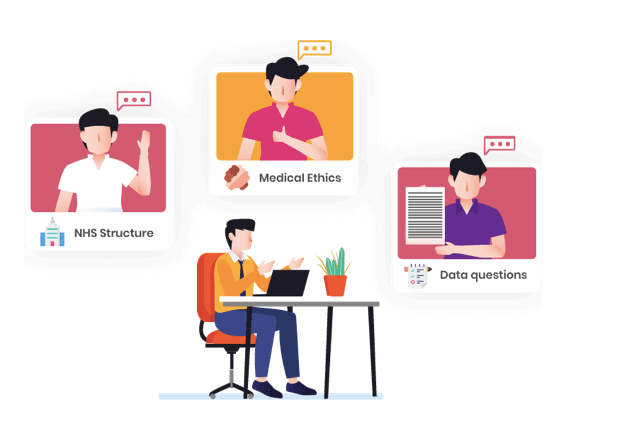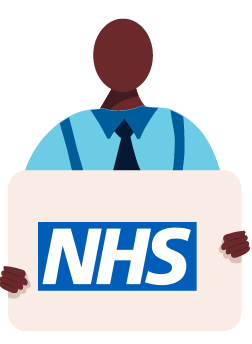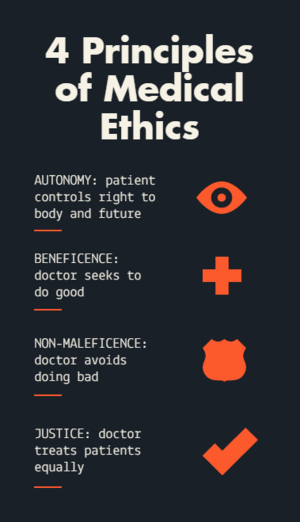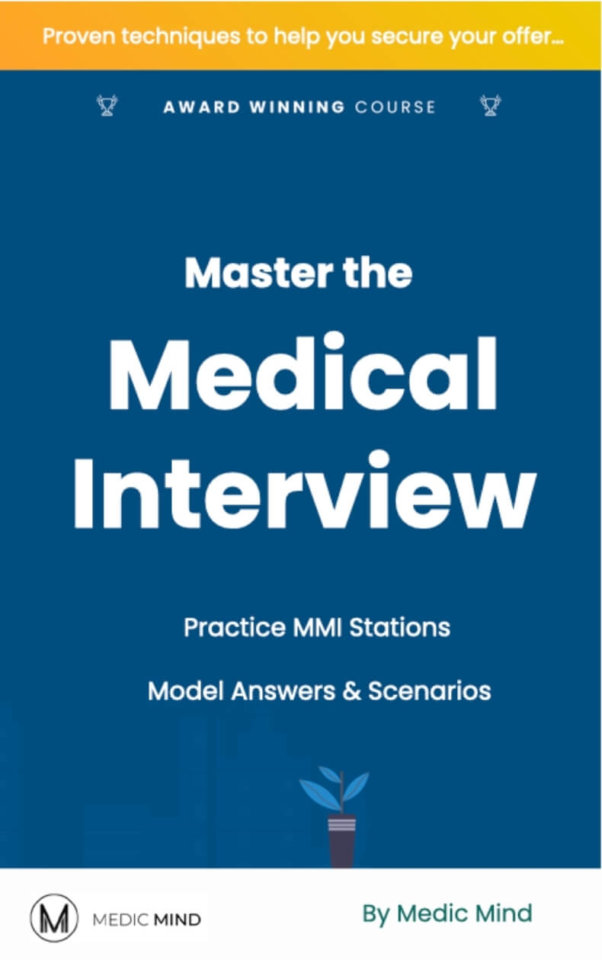Loading...


Common Medicine Interview Questions
Medicine interviews can be a nerve-wracking experience; after all, how can anyone be expected to wrap all their passion, dedication and hard work into a few minutes? And that’s where MMIs come in! The MMI format has been favored by medical schools in the UK for sometime now and for good reason – it allows for a wide set of skills to be tested both, directly through questioning and indirectly through delivery. There are a few differences between the MMI and the more traditional panel interviews. However, even the universities that prefer a more traditional panel format (eg: Oxbridge, UCL etc.) have weaved a few consequential questions into their admissions process. In the run-up to your interview, some uncertainty is to be expected, but being proactive and prepared is the most important tool for success. This guide will explore some of the key topics and questions to familiarize yourself with and further tips on how to prepare for them. Regardless of interview style, these predictable yet pivotal concepts are a must in your preparation.
One of the easiest ways to wrap your head around the hundreds of possible common medicine interview questions is to divide it into broad categories; the most recurring being motivation for medicine, soft-skills, general knowledge and ethics. These do not encompass every question that may arise in a medicine interview but they do come fairly close.

Motivation for Medicine Questions
This is the most common sequence of questions an applicant will face at a medicine interview. Be it MMI, traditional or semi-structured, the interview is a chance for the admissions team to perform a more intensive analysis of their candidates – and this is one of the more crucial steps in that process. ‘Motivation for Medicine’ questions encompass any discourse surrounding your journey into medicine, desire to study medicine and understanding of what’s to come. Common variants of these include:
- Why do you want to study Medicine/be a doctor?
- Why do you want to become a doctor as opposed to a nurse or other healthcare professional?
- What inspired you to apply to medical school?
- Tell us about the work experience you have done prior to applying to medical school?
- What attracts you to [insert university name here]’s medical school?

One of the best ways to prepare for these questions is to reflect on your experiences in an effort to tell the story that’s brought you in front of them. Be wary of being overly idealistic (i.e.; “I felt like I was born to be a doctor”) or intensive (i.e.; “I applied to medical school because I definitely want to be a cardiologist”). Rather, focus on being genuine and discussing your work experiences and academic journey. In particular, focus on reflecting on these experiences and the inspiration, motivation and logic behind them.
Soft-Skills
While a common medicine interview question, this one can creep up on you in multiple ways. In a MMI, they may test your soft skills through discussing your personal statement or role-play. In a traditional interview, there will simply be dialogue centered around the demonstration of certain soft-skills in various aspects of your life. Some of the common soft-skills that may be tested include empathy, leadership, problem-solving, prioritization, time-management, teamwork and effective communication. A more inclusive list can be found in the GMC guidelines for medical students.
In terms of preparation, your personal statement should be your best friend. Print a copy and tabulate every experience – clinical or otherwise – that you have mentioned. Reflect on each one in terms of skills developed, instances in which said skill was showcased and how you hope that these skills will hone your medical practice in the future. Add other experiences and achievements that may not have made it into your statement. Use this as a “cheat sheet” to structure your responses. This will help you schematically organize your skill-set in an effort to more efficiently communicate it.
In the event of role-play scenarios, remember that the interviewers don’t expect oscar level performances. Rather, their focus is on communication – verbal and non-verbal – and the soft-skill being employed.
Kickstart your Interview Prep
General Knowledge
General knowledge is an understandable part of any medicine interview. These questions test a student’s passion and dedication to read up on issues surrounding the world of healthcare, from more global issues like COVID-19 to more NHS-specific problems like resource distribution. A strong grasp of general knowledge issues also suggest a deeper understanding of the NHS and a career in medicine. Some common topics include:
- NHS structure
- Ethical movements (for eg, the anti-vaccine movement)
- Public health crises (for eg, obesity, mental health, antibiotic resistance etc.)
- Political issues (for eg, Brexit, privatisation of the NHS etc.)
- Problems in the NHS (for eg, resource allocation, doctor burnout etc.)

Preparing for these questions may seem daunting due to the overwhelming amount of information available online. However, remember that they won’t expect you to rival public health officials in discussing these issues. Focus on facts, reflections and measured yet effective communication strategies.
Ethics
Medical ethics are the cornerstone of modern day healthcare practice. They massively impact the doctor-patient relationship and are both a common source of comfort and debate amongst medical professionals. Consequently, it comes as no surprise that they’re commonly tested in medicine interviews. Again, these can present as role play scenarios or simple conversation. Below is a list of common ethical scenarios discussed during medicine interviews.
- The candidate is asked about the 4 pillars of medical ethics (i.e.; autonomy, justice, non-maleficence and beneficence)
- The candidate is asked if they would prescribe contraception to an underage girl without the knowledge of her parent(s) and/or guardian(s)
- The candidate is asked to choose who they would save from a set of people of different demographics
- The candidate is asked to navigate various religious requests that may interfere with their ability to perform medical procedures
This list is in no way exhaustive, with some other common ethical conundrums including conversations around abortion, end-of-life care, withdrawing medical treatment and consent. The best way to learn more about medical ethics is to simply read up about them and the various ways in which they manifest within medical practice.
We strongly recommend familiarizing yourself with the 4 pillars of medical ethics as they form the foundation upon which most modern-day treatment pathways are built. The concepts of autonomy, justice, maleficence and non-beneficence along with consent and confidentiality can be used as an informative crutch when discussing ethical issues during your interview.

Kickstart your Interview Prep
As with all complicated scenarios, there is usually more than one right answer so don’t feel pressured to be correct. Instead, focus on providing an answer that will suggest unbiased, patient-centered care. Remain calm and take your time to think through your options. Talk out loud to allow the examiner to understand your thought processes. Finally, keep your patient at the forefront of your discourse.
Whilst these categories encompass a vast majority of common medicine interview questions, they are not global. Some of the other common skills to reflect on include communicating bad news to patients or their families, tackling troublesome team members, data analysis and explaining tasks to people.
Now, with all that information to digest, it’s normal to feel overwhelmed and nervous. So this is the perfect time to bring up the most common skill sought after in a medicine interview – passion. Regardless of the question before you or the perceived apathy of the interviewer, focus on building your answer atop a strong foundation of passion and confidence. After all, that is the most important common medicine interview question – “Why should this candidate become a doctor?” – it’s just not one that they ask you directly.
Shweta Madhu
Lead Author & Medic Mind tutor

Frequently Asked Question
→What inspired you to pursue a career in medicine?
This is a common question asked in medicine interviews to understand your motivation and passion for the field. Be honest and highlight any personal experiences or encounters that have influenced your decision.
→What are some of the challenges you foresee as a doctor?
This question aims to assess your awareness of the realities of the medical profession. Be specific and provide examples of challenges such as long hours, emotional stress, and dealing with difficult patients.
→How do you cope with stress?
Medicine can be a stressful profession, and interviewers want to know how you manage stress. Provide examples of healthy coping mechanisms such as exercise, meditation, and spending time with loved ones.
→What are some of the challenges facing the healthcare industry today?
Interviewers want to assess your knowledge of the healthcare industry and your ability to think critically about its challenges. Be specific and provide examples of challenges such as increasing healthcare costs, aging populations, and access to care.
→What are your long-term career goals in medicine?
Interviewers want to know your vision for your career in medicine. Be honest and specific about your goals, including your specialty of interest, research interests, and how you plan to contribute to the medical field.
→What do you think are the most important qualities for a doctor to possess?
Interviewers are looking for qualities such as empathy, communication skills, critical thinking, and problem-solving ability. Be sure to provide examples of how you have demonstrated these qualities in your personal and professional life.
Related Articles
Related Articles
Related links
MMI interview preparation with our live interactive day and comprehensive feedback
Personalised 1-1 lessons, tailored to your interview preparation
Covering 8 interview topics, with model answers, live MMI analysis and hot topics





Was this article helpful?
Still got a question? Leave a comment
Leave a comment